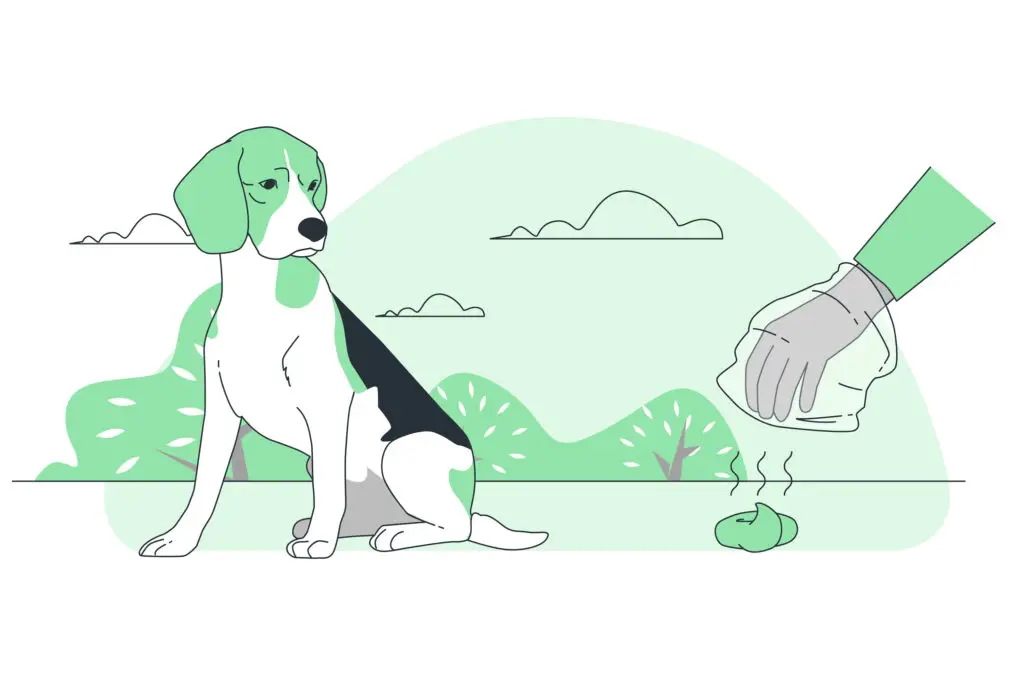Having a well-trained and obedient dog is every pet owner’s dream. However, one common challenge that many dog owners face is dealing with their furry friends pooping inside the house. If you find yourself asking, “Should I punish my dog for pooping in the house?” or “How can I train my dog not to poop indoors?”, you’ve come to the right place.
In this comprehensive guide, we will explore the reasons why dogs may poop indoors, discuss whether punishment is an effective method, and provide practical solutions to train your dog to poop outside.
Additionally, we’ll cover essential tips on how to clean up after a doggie accident, ensuring a clean and hygienic living space for both you and your furry companion.
So, let’s delve into the world of dog behavior and training to better understand and address this issue effectively.
Understanding Why Dogs Poop Inside

Territorial Marking and Anxiety
Dogs are territorial animals by nature, and sometimes, pooping indoors may be a way of marking their territory. This behavior is more common in unneutered or unspayed dogs and is usually accompanied by urine marking.
Additionally, separation anxiety can also lead to indoor pooping, especially when your dog feels stressed or lonely when left alone.
Medical Issues and Digestive Problems
If your dog suddenly starts pooping inside the house despite being previously house-trained, it could be an indication of underlying health issues.
Digestive problems, dietary changes, or infections can lead to irregular bowel movements and accidents indoors.
Lack of House Training
Puppies, in particular, may not yet have been fully house-trained, leading to occasional accidents indoors. Consistent and patient training is essential to teach them appropriate elimination behaviors.
Aging and Incontinence
As dogs age, they may experience a decline in bladder and bowel control, leading to unintentional indoor accidents. Senior dogs may need more frequent potty breaks and understanding care.
Should You Punish Your Dog for Pooping in the House?

The Ineffectiveness of Punishment
Punishing your dog for pooping in the house is generally not recommended. Using punitive measures, such as scolding, hitting, or rubbing your dog’s nose in the mess, can be detrimental to your pet’s well-being and can even worsen the behavior.
Dogs do not associate punishment with past actions; instead, they might become fearful of you or anxious, making training even more challenging.
Positive Reinforcement: The Key to Successful Training
Instead of punishment, positive reinforcement is the most effective method for training dogs. Rewarding your dog for eliminating outdoors will create positive associations with appropriate potty behavior.
Treats, praise, and affection when your dog poops outside will encourage them to repeat the behavior.
How to Train Your Dog to Not Poop in the House

Establish a Consistent Routine
Creating a consistent potty schedule is crucial for training your dog. Take your dog out at regular intervals throughout the day, such as after meals, playtime, or waking up in the morning. Consistency will reinforce the behavior you want.
Use Crate Training
Crate training can be beneficial, especially for puppies or dogs who struggle with house training. Dogs naturally avoid soiling their living spaces, making a crate a useful tool for guiding them towards proper elimination habits.
Supervision and Positive Reinforcement
Supervise your dog closely when they are indoors, especially during the initial stages of training. If you catch them in the act of pooping indoors, interrupt the behavior gently and take them outside immediately. Once they finish their business outdoors, reward them with treats and praise.
Manage the Environment
Limit your dog’s access to areas where accidents have occurred in the past. Use baby gates or close doors to prevent them from revisiting those spots. Simultaneously, ensure your dog has easy access to the designated outdoor potty area.
Consult a Professional Trainer
If you find that your efforts are not yielding the desired results or if you’re dealing with complex behavioral issues, seeking the assistance of a professional dog trainer or animal behaviorist can be immensely beneficial.
Cleaning Up After Dog Poop in House

Act Promptly
When accidents happen, it’s essential to act promptly. The longer the mess sits, the harder it can be to remove and eliminate odors that might attract your dog to the same spot again.
Use Enzymatic Cleaners
Regular household cleaners might not fully eliminate the smell of dog urine or feces, which can lead to repeat accidents. Instead, use enzymatic cleaners specifically designed to break down the odor-causing molecules.
Blot, Don’t Rub
When cleaning up urine or feces, avoid rubbing the affected area, as this can push the mess further into the carpet or floor. Instead, blot the area gently with a clean cloth or paper towel.
Rinse and Repeat
After using the enzymatic cleaner, rinse the area thoroughly with water. Ensure that the spot is completely dry to prevent your dog from detecting any lingering odors.
Conclusion
Training your dog to poop outside the house is a journey that requires patience, consistency, and positive reinforcement. Punishing your furry friend for indoor accidents is not the answer. Instead, focus on building a strong bond with your dog through love, understanding, and effective training techniques.
Remember that each dog is unique, and progress might take time. Be patient and celebrate every step forward. By creating a positive and supportive environment, you’ll find your dog happily doing their business outdoors, bringing you both closer and leading to a happier, healthier companionship.
Frequently Asked Questions (FAQs)
Q: Why does my dog keep pooping inside the house?
A: There can be several reasons for this behavior. It could be due to territorial marking, anxiety, medical issues, lack of proper house training, or even age-related incontinence in senior dogs.
Q: Should I punish my dog for pooping indoors?
A: No, punishing your dog for indoor accidents is not recommended. Positive reinforcement, such as rewards and praise for pooping outside, is a more effective and humane way to train your furry friend.
Q: How can I train my dog to poop outside?
A: To train your dog to poop outdoors, establish a consistent potty routine, use crate training, supervise your dog indoors, manage the environment to prevent accidents, and seek professional help if needed.
Q: Can crate training be helpful for house training my dog?
A: Yes, crate training is an effective method for house training, especially for puppies or dogs with house training challenges. Dogs naturally avoid soiling their living spaces, making a crate a useful tool for guiding them towards proper elimination habits.
Q: What should I do if my dog has an accident indoors?
A: If your dog has an accident indoors, act promptly to clean up the mess. Use enzymatic cleaners specifically designed to eliminate odors, blot the affected area gently, rinse thoroughly with water, and ensure the spot is completely dry to prevent repeat accidents.

